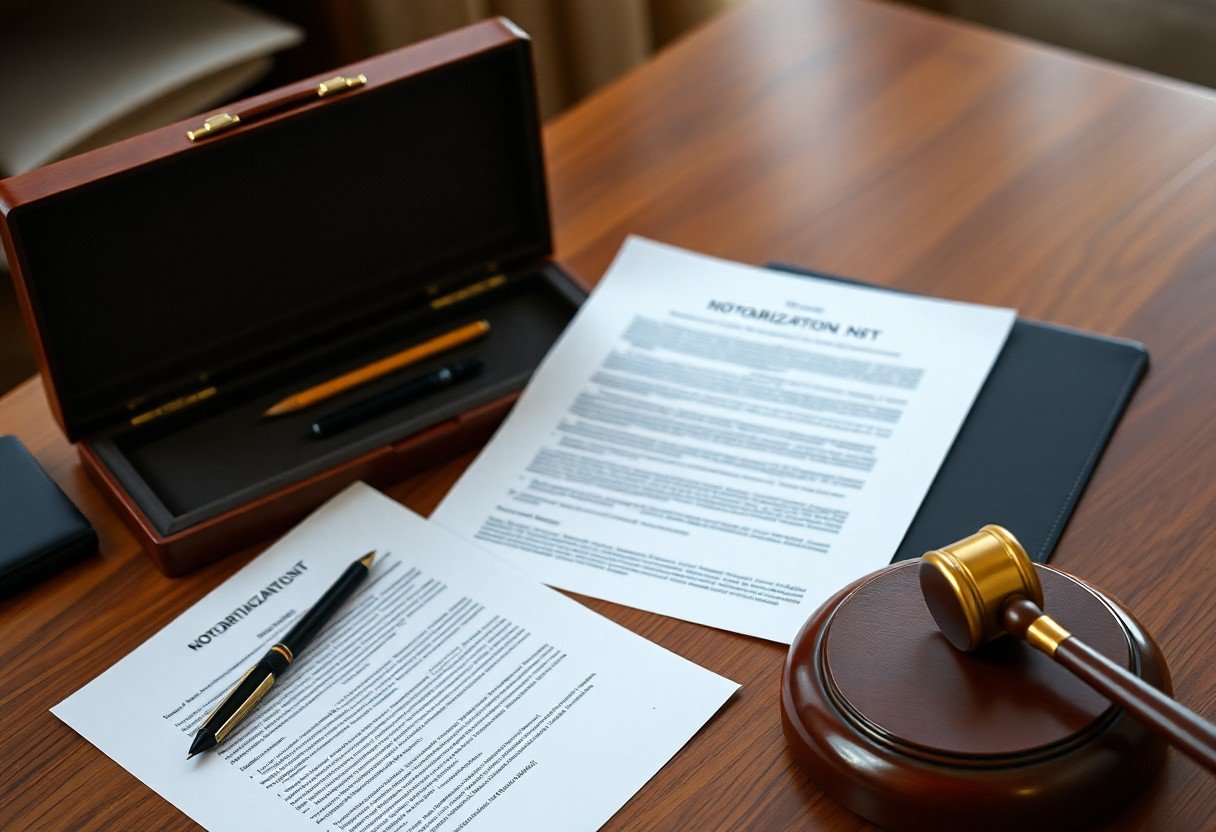Physical Address
304 North Cardinal St.
Dorchester Center, MA 02124
Physical Address
304 North Cardinal St.
Dorchester Center, MA 02124

Over time, you may face the necessity of preparing end-of-life legal documents such as wills and advanced directives. Understanding the importance of notarization in this process is vital, as it helps ensure that your documents are legally binding and respected by courts and institutions. Notarization adds an extra layer of authenticity, validating your identity and confirming your intent, which can prevent disputes among heirs and loved ones. In the following sections, you’ll discover why this step is integral to protecting your wishes and securing peace of mind for you and your family.

Notarization serves as an imperative component of the legal landscape, ensuring that documents maintain their integrity and authenticity. When a notary public witnesses the signing of a document, it adds a level of verification that the signatures are genuine and that the signers understood the implications of the documents they were endorsing. This process not only fortifies the document’s reliability but also augments its standing in court, providing you with increased assurance that your wishes regarding end-of-life affairs will be honored.
Notarization functions as a formal verification process within legal frameworks, establishing the authenticity of signatures and the intent of the signers. By acting as an impartial witness, a notary helps ensure that all parties are enter into agreements willingly and with full understanding. This transparency is critical in end-of-life documents, where the stakes can be particularly high.
Fraud protection is a vital aspect of notarization, as it significantly reduces the likelihood of forgery or misrepresentation. With thorough identity verification and the notary’s official seal, documents are difficult to manipulate after the signing has taken place, thereby establishing a solid defense against any potential disputes that may arise. The presence of a notary can deter malicious intent, ultimately safeguarding your wishes during critical moments.
For instance, consider the case of a living will. Should disputes arise regarding whether the document was signed voluntarily, the notarization process provides a clear trail showcasing that all procedures were followed correctly. Documentation verified by a notary carries considerable weight in judicial review, reducing the chances of litigation based on claims of undue influence or coercion. This protective layer is integral, as it ensures that your decisions regarding health care or distribution of assets are upheld and respected, reducing stress for your loved ones during an already challenging time.

When dealing with end-of-life documents, obtaining proper authentication through notarization ensures that your wishes and intentions are honored. Legal documents for end-of-life planning in Louisiana, such as wills, medical directives, and powers of attorney, benefit from the added layer of security that notarization offers. This process verifies the authenticity of signatures and protects against potential disputes, making it a vital step in safeguarding your legacy. For more on the various documents needed, check out this resource on Legal Documents for End-of-Life Planning in Louisiana.
Wills and trusts are fundamental components of your estate planning, dictating how your assets will be distributed after your passing. A legally binding will outlines your desires regarding asset distribution and guardian appointments for minors, while trusts can help avoid probate and provide additional privacy and control over how your assets are managed. Proper notarization of these documents ensures their validity, reducing the risk of future challenges.
Living wills and healthcare directives express your healthcare preferences in situations where you might not be able to communicate them directly. These documents come into play during serious health crises, ensuring that medical personnel and family members follow your wishes regarding life-sustaining treatments. Notarization serves as verification that your directives are genuine and reflect your true intentions, helping to minimize confusion and potential conflict among family members.
Notarizing living wills and healthcare directives not only upholds their validity but also reassures healthcare providers that they are acting according to your documented wishes. This step can prevent legal disputes and emotional turmoil among loved ones during an already challenging time. By ensuring compliance with state laws, a notarized document solidifies your authority over healthcare decisions, paving the way for smoother communication amongst all parties involved. Trust in the notarization process can make all the difference when stakes are high and clarity is paramount.
Missteps in notarization can lead to dire consequences for your legal documents, especially those related to end-of-life planning. Failing to adhere to state-specific requirements or overlooking necessary signatures can render a document invalid. Additionally, being uninformed about the signer’s capacity or the notary’s jurisdiction can jeopardize the entire process. Understanding these pitfalls is imperative to preserving the integrity of your important legal paperwork.
Errors such as missing dates, inadequate identification, or improper execution can void your documents and create legal complications. You might think a casual approach to notarization suffices, but even small oversights can lead to severe consequences. Ensure that every detail is meticulously completed to avoid invalidation.
Proper witnessing and signature verification are pivotal in the notarization process. Each signatory must be physically present and provide proof of identity, supported by acceptable identification documents. The notary should not only verify signatures but also ensure that witnesses understand their roles and the importance of their testimony, adding another layer of security to the document’s legitimacy.
To ensure proper witnessing and signature verification, you need to coordinate effectively with all parties involved. Each witness should confirm their identity and be aware of their responsibilities, as their signatures affirm the authenticity of the primary signer’s intentions. Some states may require additional witness signatures for specific types of documents. Furthermore, the notary must document this witnessing accurately in their logbook, including the date, time, and nature of the act performed. This level of diligence not only safeguards your documents but also strengthens their validity in the eyes of the law.
Successfully navigating the notarization process involves a few crucial actions. Start by identifying a qualified notary public, understanding the requirements for your specific documents, and preparing them thoroughly before your meeting. Familiarize yourself with any state-specific regulations, as they can vary widely. Resources such as Notarizing Documents for Seniors With a Dementia Diagnosis can provide additional insights tailored to your situation.
Selecting a suitable notary public requires consideration of their qualifications, experience, and familiarity with the specific legal documents you need notarized. Look for professionals who specialize in end-of-life documents, as they will better understand the complexities involved. It may also be beneficial to check reviews and ask for recommendations from trusted sources.
Properly preparing your documents before notarization can ensure a smoother process and prevent delays. Gather all necessary paperwork, including identification, signatures, and any relevant supporting documents. Verify that all forms are complete and signed appropriately, as most notaries will not certify your documents unless they are fully ready for processing. Additionally, note any specific information required for the notarization, such as witnesses or other legal stipulations. Being organized will streamline your appointment and avoid potential issues.
In some cases, certain documents may require witnesses in addition to notarization. If that’s the case for your end-of-life planning documents, ensure that those individuals are available at the time of notarization. If you’re unsure which documents need notarization or witnesses, consulting with an attorney is beneficial. Preparing adequate copies of each document can also be helpful, as it gives you backups in case any issues arise during the notarization process.
While notarization adds a layer of protection to your end-of-life legal documents, exploring alternative safeguards can enhance their validity. Engage in comprehensive end-of-life planning by considering legal counsel and additional witnesses. Each of these measures provides unique benefits, fostering peace of mind as you prepare for the future.
Consulting with legal counsel during the creation of your end-of-life documents provides expert advice tailored to your specific needs. Attorneys ensure your wishes align with state laws, minimizing risks that could invalidate your plans. They can also help clarify complex terms and procedures, making sure your intentions are clearly communicated.
Involving additional witnesses can significantly bolster the integrity of your end-of-life documents. Many jurisdictions require witnesses to attest that you were in sound mind and not under duress when signing. Having credible witnesses can also deter potential disputes and validate the document’s authenticity should it ever come into question.
Enhancing validity through additional witnesses not only strengthens the legal standing of your documents but also dissuades future challenges. Ideally, select individuals who are not beneficiaries or involved in the estate, as impartial testimony carries more weight. Having two or more witnesses, depending on state requirements, provides an extra layer of assurance that your healthcare directives or wills truly reflect your desires. This collaborative approach ensures that your intentions remain respected even under scrutiny.
Now that you understand the importance of notarization in end-of-life legal documents, you can appreciate how it safeguards your wishes and provides clarity for your loved ones. By ensuring that your documents are notarized, you not only add a layer of authenticity but also help prevent disputes and uphold their validity in legal contexts. Taking this step signifies your commitment to protecting your legacy and easing the burden on those you care about most during a challenging time.